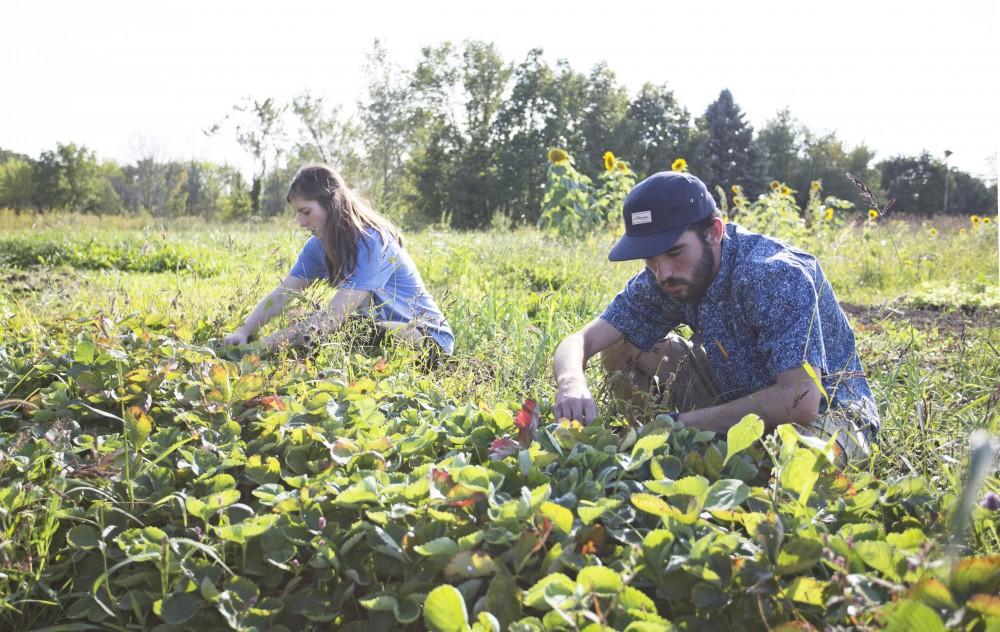Cultivating sustainability

GVL / Kevin Sielaff Austin VanDyke and Skyla Snarski work the fields on Sept. 15. Grand Valley’s Sustainable Agriculture Project aims to promote local awareness concerning the environment and sustainability efforts.
Sep 17, 2015
What was once a community garden has cultivated itself into a project like no other at Grand Valley State University. The Sustainable Agriculture Project has given students a way to organically connect with the Earth and with each other for the past seven years.
Since 2008, the farm has been available to students as a way for them to relax, get dirty and learn how to grow their own food while helping the farm do just that.
Today, the farm consists of vegetable and flower gardens, greenhouses and even a rainwater reclamation system.
Youssef Darwich, the farm manager, has been with the farm for four years, starting out as a volunteer and then moving into his current position once he graduated from GVSU.
“There’s so much that goes into running the farm,” Darwich said. “I’ve been out here for four years, and every day I come out and I see something new. You’re always learning.”
The farm acts as much more than a farm, providing a place for students to apply their classroom learning to real practice by conducting natural science research on the soil, learn how to operate sustainable food systems and volunteer.
“During volunteer hours, you can have so many people come together and actually work on something constructive,” Darwich said. “In society, there aren’t many opportunities for interaction like that.”
Current intern Austin VanDyke first got involved with the farm by volunteering. He was interested in volunteering because he wanted to know how to grow his own food.
“It’s something that a lot of people are really disconnected from, the food system and the food chain,” he said. “I think that it’s really cool to be able to say, ‘I grew this tomato.’ You get to see it come full circle.”
The farm has open volunteer hours on Mondays and Fridays when students can help out the farm in any way they can. They are welcome to structure their time however they want, whether it is watering plants for 15 minutes or planting seeds for three hours.
Students can also learn how to harvest the food that they are growing. On Tuesdays, the farm prepares for GVSU’s weekly farmers market by harvesting, cleaning and packing the food to be ready to go for Wednesday.
The farm produces for much more than the farmers market. The project also has a community-supported agriculture, or CSA, program that people can buy shares of for part of the season or for all of it. While it’s mostly faculty that take advantage of the CSA program, students are welcome to do so too.
This past season, demand for shares of the CSA has increased past the point of production for the farm. Darwich welcomes the demand as a sign of awareness.
“It shows that the work that we’re trying to spread here is getting out,” he said. “People are learning about what we’re doing and they’re getting involved, and the CSA is just one way to (do that).”
In addition to the CSA program, the farm also has partnered with GVSU to occasionally provide food to campus dining to use as local, fresh ingredients.
“It’s pretty exciting to see the potential there,” he said. “We’re still learning and growing as a farm, but it’s nice to know that there’s a destination for all this food.”
While the farm does not produce nearly enough to provide to campus on a regular basis, VanDyke said the farm isn’t made just for that one task.
“The goal isn’t to grow as much food as possible,” VanDyke said. “I think the goal is to foster a learning environment and just a very healthy community of people who can all work together.”
The farm acts as a learning environment for classes, too. Many classes with subjects ranging from women in gender studies to natural resources management conduct class on the farm or do field trips throughout the year.
Whether it’s through class, by visiting the farmers market or volunteering at the farm throughout the week, Darwich said the farm welcomes everyone.
“There’s always room for ideas here,” he said. “We’re so open to new ideas.”
For more information about the Sustainable Agriculture Project, visit www.gvsu.edu/sustainability.






















